|
|
|
Sort Order |
|
|
|
Items / Page
|
|
|
|
|
|
|
| Srl | Item |
| 1 |
ID:
108370
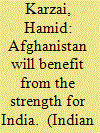

|
|
|
| 2 |
ID:
077364
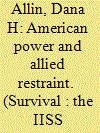

|
|
|
| 3 |
ID:
081313
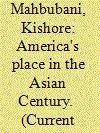

|
|
|
|
|
| Publication |
2008.
|
| Summary/Abstract |
The moment has come for fresh US policy on East Asia. This should be priority number one for the new president
|
|
|
|
|
|
|
|
|
|
|
|
|
|
|
|
| 4 |
ID:
052472
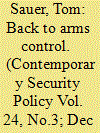

|
|
|
|
|
| Publication |
Dec 2003.
|
| Summary/Abstract |
Since the end of the 1990s, the United States is spending an enormous amount of time, money and energy in developing a workable missile defence system. The Bush administration plans to deploy a couple of missile interceptors in Alaska and California before September 2004. This article assesses different US missile defence scenarios, using four criteria: technological feasibility, cost, threat perception, and strategic stability. Based on these four criteria, we conclude that only a limited US NMD system that is not easily expandable will be acceptable for the other global actors, including Russia, China and Europe. It also requires a multilateral anti-ballistic missile treaty that sets limits to missile defence.
|
|
|
|
|
|
|
|
|
|
|
|
|
|
|
|
| 5 |
ID:
093920
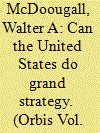

|
|
|
|
|
| Publication |
2010.
|
| Summary/Abstract |
Two big issues that scholars and strategists need to address are simply: does grand strategy have to be articulated for it to be said to exist at all; and if not, can grand strategy be said to move a nation even when that nation's fluctuating roster of (often competent) leaders are unsure as to why they do anything? My task here is that of a rapporteur and provocateur raising issues on which we may need to reach some consensus.
|
|
|
|
|
|
|
|
|
|
|
|
|
|
|
|
| 6 |
ID:
063384
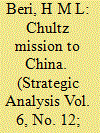

|
|
|
| 7 |
ID:
163149
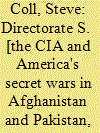

|
|
|
|
|
| Publication |
India, Penguin Random House, 2018.
|
| Description |
xxiii, 757p.hbk
|
| Standard Number |
9781846146602
|
|
|
|
|
|
|
|
|
|
|
|
Copies: C:1/I:0,R:0,Q:0
Circulation
| Accession# | Call# | Current Location | Status | Policy | Location |
| 059569 | 958.1047/COL 059569 | Main | On Shelf | General | |
|
|
|
|
| 8 |
ID:
183793


|
|
|
|
|
| Summary/Abstract |
In The Abandonment of the West, Michael Kimmage explores the relationship between American foreign policy and the ‘West’. The concept of the West, once a unifying idea in American culture, has undergone a sharp re-evaluation over the last century. Kimmage does not idealise the West or its history, giving a voice to the many critics of Western civilisation who have pointed out examples of US hypocrisy. At the same time, he notes that the West, especially in its heyday, accomplished great things, and he cautions against its wholesale abandonment – particularly at a time when the US and its allies are facing a host of domestic and international challenges.
|
|
|
|
|
|
|
|
|
|
|
|
|
|
|
|
| 9 |
ID:
127501
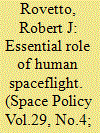

|
|
|
|
|
| Publication |
2013.
|
| Summary/Abstract |
The question is: should the United States and nations at large pursue a human spaceflight program (and if so, why)? I offer an unwavering positive answer to this question, and state the reasons for it while considering the broad challenges and benefits of (human) spaceflight. Space exploration is a human activity that is intrinsically forward-looking, and as such, has positive potential. Both national and international space programs can galvanize the population, inspire the youth, foster job-creation, and motivate the existing workforce. The nature of the enterprises involved-their scale, novelty, and complexity-requires a steady and continuous upward progression toward greater societal, scientific and technological development. That is, in order to overcome the challenges of human spaceflight, progress is required. More to the point, the survival of humanity depends on expanding beyond the confines of our planet. Human spaceflight, in short, presents us with an opportunity to significantly advance the nation and the global community.
|
|
|
|
|
|
|
|
|
|
|
|
|
|
|
|
| 10 |
ID:
089998
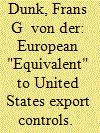

|
|
|
|
|
| Publication |
2009.
|
| Summary/Abstract |
This article analyzes the system developed within Europe, more precisely within the European Union through European Community law, to address the security-sensitive issues involved in the export of hardware, software, and knowledge for the purpose of space activities and major space applications. The subject is introduced with reference to the far better known export control developments within the United States, such as those concerning International Traffic in Arms Regulations, and the international understandings under the Missile Technology Control Regime and Wassenaar Arrangement. European Community Regulations for export controls provide for a complex system of balances between national sovereignty and Europe-wide harmonization. This European Community regime, though ultimately still dependent upon individual state's sovereign controls, establishes an interesting measure of international harmonization in security-sensitive export controls. Although the European Community regime is fraught with many complexities, it manages to avoid some of the pitfalls evident in the United States and international regimes, notably the confusing discussions on discerning weaponry proper from other space items with dual-use potential. This is the result mainly of an approach characterized by a primary intention to harmonize, rather than to apply strict controls per se, resulting in a transparency and consistency that are not only valuable to commercial entrepreneurs, but also to those concerned primarily with the security risks posed by the international space industry. As for the space industry in particular, it is helpful that the European Community regime specifically carves out civil space activities, for example if conducted within the context of the European Space Agency or national space agency activities.
|
|
|
|
|
|
|
|
|
|
|
|
|
|
|
|
| 11 |
ID:
175862
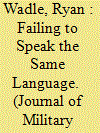

|
|
|
|
|
| Summary/Abstract |
Between the world wars, senior officers in both the U.S. Army and U.S. Navy sought to create an interservice culture through the integration of strategic planning, professional military education, and, most importantly, the conduct of large-scale joint exercises. Rather than solely emphasizing the issue of command arrangements that dominate previous studies, this study highlights a number of factors that complicated efforts to cooperate, including disagreements over individual service responsibilities, the advent of new technologies and capabilities, and the cultural divide between the services. Ultimately, these measures to institutionalize coordination and regular joint training fell short of their intent and left a mixed legacy.
|
|
|
|
|
|
|
|
|
|
|
|
|
|
|
|
| 12 |
ID:
125972
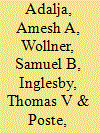

|
|
|
|
|
| Publication |
2012.
|
| Summary/Abstract |
Recent cases of counterfeit and contaminated medication have raised concerns about the integrity of the US supply chain of pharmaceuticals. Moreover, Shortage in oncology drug have highlighted a weak domestic production capacity for essential medication. The FDA and the Pew Charitable Trusts have published analyses of the problem as they relate to the US's regulatory system and healthcare industry. These issues also represent a potential national security threat.
|
|
|
|
|
|
|
|
|
|
|
|
|
|
|
|
| 13 |
ID:
187648
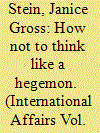

|
|
|
|
|
| Summary/Abstract |
As the United States experiences a relative decline in its share of global GDP and China increases its relative share, there is growing concern about the consequences of intensifying competition between the two great powers. This article takes a wider angled view, warns against a single narrative and provides a collection of plausible stories. First, the story of the rise of China and the decline of the United States that relies heavily on ‘hard’ measures like GDP and relative military capability overlooks other relevant indicators such as normative and network power. I argue that the United States enjoys considerable advantages as measured by both these indicators and will continue to do so for some time. Second, the status of a great power in the international system is a product not only of systemic and structural forces but also of economic and political capacity that enables governments to make strategic choices. The future is contingent, not determined, because the strategies leaders choose matter. I build a matrix of nine possible worlds that result from the choices that the leaders of China and the United States could make over the next twenty years. Finally, I argue that the biggest threat to international peace may come not from rising powers, but when the leaders of the challenger as well as the defender fear that their power may have peaked and that they are beginning to decline.
|
|
|
|
|
|
|
|
|
|
|
|
|
|
|
|
| 14 |
ID:
117962
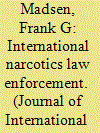

|
|
|
|
|
| Publication |
2012.
|
| Summary/Abstract |
This year sees the celebration of the first century of international legal provisions against the illicit production and trade of narcotics substances. Accordingly, this is an appropriate moment to evaluate the results obtained. The following essay considers how the international prohibition regime created the crime of drug trafficking. The ensuing function of denied demand is the inescapable basis for the development of organized crime. Second, costs of the regime are critically assessed. The former include institutional costs of law enforcement and of the incarceration of individuals sentenced for drug trafficking and related offences, e.g., violence and financial crimes. The indirect costs are difficult to gauge and impossible to monetize. They include the immense suffering caused by drug trafficking as well as the deterioration of public services due to corruption. The present situation on both sides of the U.S.-Mexico border is sufficiently eloquent evidence. Also, narcotics legislation leads to racial tension since the incarceration rates for non-whites for these offences is considerably higher than for whites in the United State and the United Kingdom. Third, political premises are briefly analyzed, namely the implementation of narcotics liaison offices in foreign jurisdictions and the linking of foreign aid and trade privileges to a certification of trade partners' adherence to U.S. antinarcotic drugs law enforcement. One might claim, somewhat counterintuitively, that decriminalization of drug trafficking is not necessary. Drug trafficking has already been decriminalized de facto, if not de jure, by the sheer, constant saturation of the market place.
|
|
|
|
|
|
|
|
|
|
|
|
|
|
|
|
| 15 |
ID:
170625
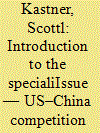

|
|
|
| 16 |
ID:
126379
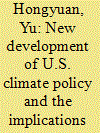

|
|
|
| 17 |
ID:
171627
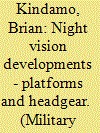

|
|
|
| 18 |
ID:
090179
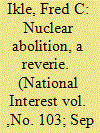

|
|
|
|
|
| Publication |
2009.
|
| Summary/Abstract |
Sixty-two years ago, Dean Acheson warned President Truman that nuclear weaponry was "a discovery more revolutionary in human society than the invention of the wheel"and that "if the invention is developed and used destructively there will be no victor and there may be no civilization remaining." Dean Acheson was certainly no woolly-eyed disarmer. He promoted the Atlantic alliance as a bul-wark against Soviet expansion.Yet, he recommended approaching Stalin to explore international controls for global ban on nuclear weapons.
|
|
|
|
|
|
|
|
|
|
|
|
|
|
|
|
| 19 |
ID:
118390
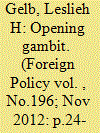

|
|
|
| 20 |
ID:
015633
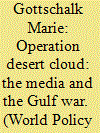

|
|
|
|
|
| Publication |
Summer 1992.
|
| Description |
449-386
|
|
|
|
|
|
|
|
|
|
|
|
|
|
|
|
|
|
|
|
|